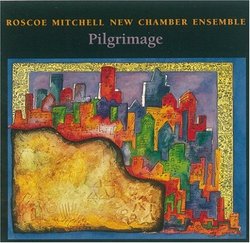But For Racism, He Would Be Played In Concert Halls
Christopher Forbes | Brooklyn,, NY | 10/07/2002
(5 out of 5 stars)
"One of the elements that make the music of the AACM in Chicago unique is that so many of the composer/performers in the group resist stylistic boundaries. Roscoe Mitchell is a definate leader in this, along with Anthony Braxton and George Lewis. This album is dedicated to music by Mitchell that combines notated sections and approaches to improvisation to create marvelous chamber compositions which rival anything coming out of more traditional new music composers. The album consists of music for a small ensemble of Mitchell on winds, piano violin, and on most of the pieces, Thomas Buckner, the formidable contemporary baritone. Mitchell has chosen to set a wide variety of challenging poems to music, including poems by E. E. Cummings, Lord Byron, and Joseph Jarman. Also included is one of Henry Threadgill's compositions based on a poem by Thulani Davis. These are interspersed with Mitchell's instrumental ompositions. All in all this is an impressive CD.What impresses most about this disc is Mitchell's deft way with a vocal melody. He knows the voice intimately, despite a lack of documented vocal music on his resume. The word setting is careful and exquisite...the poems are always audible, and yet the vocal line increases the meaning of the poem rather than being a distraction, the mark of a great writer of art song. What also impresses is the near impossibility of telling the difference between notated and improvised sections in the music. The relationship between material is so seamless that the improvisations seem to flow directly out of the basic material. Perhaps this is why Mitchell's music gets short shrift by the new music establishment. It is threatening to those who believe in total organization to hear results that are so similar, based on skillful improvisation. Of course, a subtle racism also plays into this. Mitchell and Braxton have both reported recieving patronizing responses by many in the new music community when they've tried to interest them in these works. (Braxton reports getting dissed by the man himself, Pierre Boulez, during the early 70s in Paris.) And also, despite nearly 40 years of experiments in improvisation in classical music, most non-jazz musicians still just don't get it. (Morton Feldman gave up his graphic scores after a while, when too many performers kept playing triads instead of the complex harmony that Feldman was interested in.) It's too bad, because musicians like Mitchell show us all a way out of the various stylistic traps that have hemmed in composers in the late 20th century. The merging of composition and improvisation is perhaps the most exciting development of the last 40 years, and one that could have enourmous repercussions for music in the next century."


 Track Listings (10) - Disc #1
Track Listings (10) - Disc #1